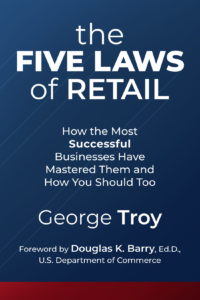Taxes and the Right Way to Run a Successful Retail Business
No well-run retail business ever based a single important decision or developed an important strategy based on their tax rate. Ever. The corporate tax rate is entirely irrelevant to developing and executing a successful retail strategy.
That would be like saying, “I’ll decide the color of the car I am going to buy based on where I park it.” Not on the size, cost, style, or all the other things that go into the big decision of buying a car.
For a retail business to succeed it must follow some version of The Five Laws of Retail. Let’s look at just a couple, any one of which is more important than the businesses tax rate.
The Second Law, “Turn is Magic,” focuses on how quickly or slowly the owned inventory turns into revenue. Regardless of what the business is selling—books, shoes, bicycles, or bananas—the question to ask is this: Is the inventory turning at the appropriate rate for that category? Bananas turn very quickly, every few days. Bicycles turn much more slowly, and because shoes come in so many sizes, an appropriate turn is about 4x/year. The question is never how much the taxes are going to be.
The Third Law, “The Power of the Product” means if the product isn’t right, there isn’t anything in the world that will make it successful. As an example, in the 1960s, Ford Motor Company developed a new brand of automobile that they were certain would revolutionize car design and be wildly successful. Accordingly, they threw everything they had at it. Marketing, delivery, hot, sexy advertising—everything. It did not work because the product was not right. I’m speaking, of course, of the Edsel.
The failure of that product had nothing at all to do with Ford’s tax rate.
The Fourth Law, “ It’s About the Retail Price, Not the Cost.” Whatever you’re selling, you’ve got to set the retail price at what people are willing to pay for it. They don’t care what it cost you. It would be tough to sell bananas for $100 per bunch, for example, just to make a stupendous profit. People wouldn’t pay that. Eventually the Edsel had to be sold at steep discounts, even below the cost of manufacturing, because that is what it turned out be to be worth to the consumer. Conversely, UGG boots, at $150 a pair, are seen as a tremendous value in terms of quality and desirability. None of that has anything do with the ultimate tax rates for the companies involved.
Only rich people worry about taxes. I used to take my shirts to a local laundry run by an immigrant family. It was a classic American store. The lady who ran the shop could barely speak English. She and her husband had built a business and a family, and her son was just beginning Stanford Medical School; they had plenty to be happy about. But one of the things she was most proud of and most happy about was when she had made enough money to pay federal income taxes. She was proud of the opportunity to contribute to the country, and she was all smiles when she made enough to do that. Most of the people who complain about paying corporate or personal income taxes are those who have enough money, but they just want to keep more of it for themselves.
Taxes are the result of developing and executing a successful business strategy—not a reason for developing one in the first place. If a company is basing decisions on their projected tax rate, that is a clear indication that they are trying to squeeze a few bucks out at the end of the process; that is the only thing they have left. They’ve failed to have the right product at the right price, they’ve failed to build a creative, productive team, and they’ve failed to manage their inventory properly. They’ve failed to follow The Five Laws of Retail.
To stay up-to-date with the latest, sign up for the newsletter.















